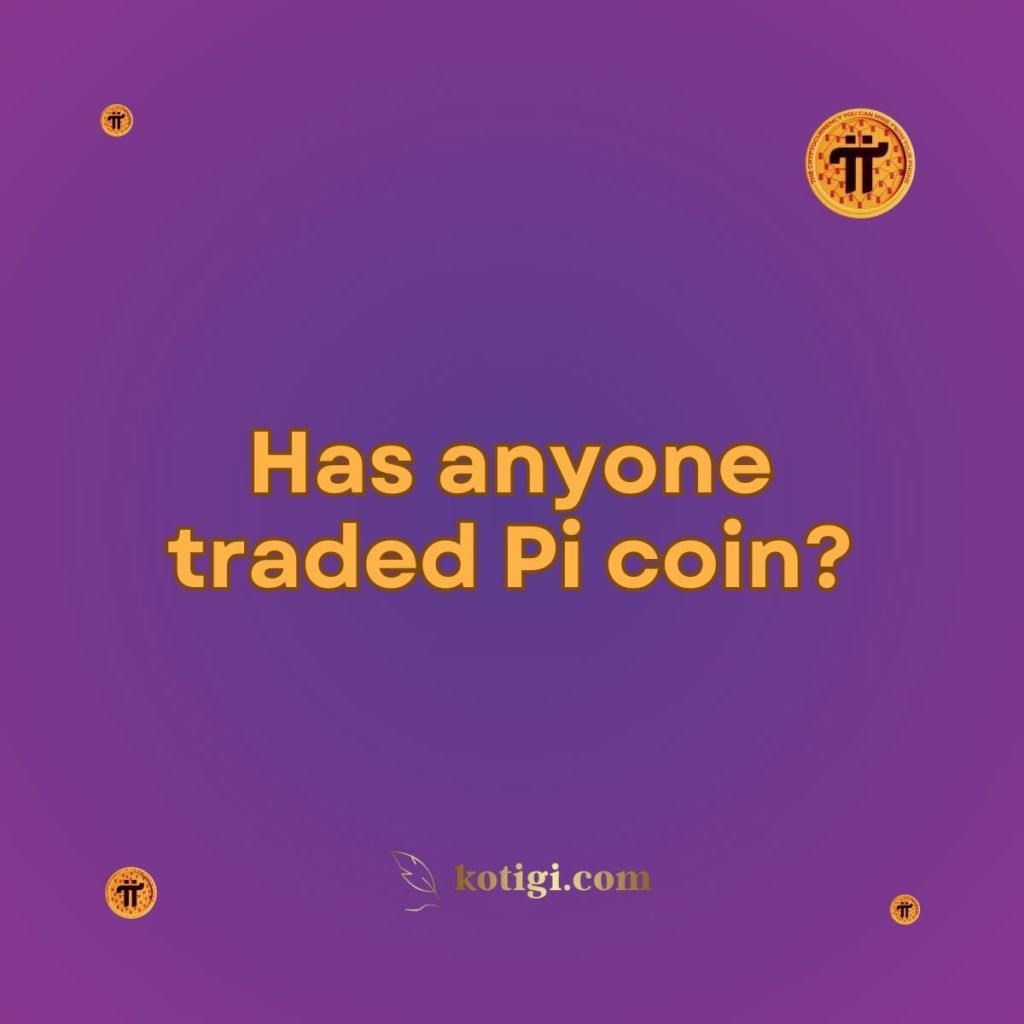
Pi Network, launched in 2019, has garnered a large user base eager to understand its potential. However, a common question is whether Pi coins have been traded. Given that Pi Network is still in its enclosed mainnet phase, the official trading of Pi coins has not yet occurred. This article explores the current status of Pi coin trading and the factors influencing its future market presence.
Has anyone traded Pi coin?
As of now, Pi Network is in its enclosed mainnet phase, and Pi coins cannot be traded on cryptocurrency exchanges. While there have been unofficial marketplaces and speculative discussions about Pi, no formal trading of Pi coins has occurred in regulated or major cryptocurrency exchanges.
Current Status of Pi Coin Trading
Enclosed Mainnet Phase
Pi Network is currently operating in an enclosed mainnet phase. This means that while users can mine Pi coins, these coins are not yet tradable on major cryptocurrency exchanges. The enclosed mainnet allows the Pi team to focus on developing the network’s infrastructure and addressing any technical issues before moving to an open mainnet.
Lack of Exchange Listings
Since Pi coins are not listed on any major cryptocurrency exchanges, formal trading is not possible. The lack of exchange listings means that there is no official market price for Pi coins, and any transactions involving Pi are limited to internal transfers within the network.
Unofficial Marketplaces
There have been reports of unofficial marketplaces or peer-to-peer platforms where users attempt to trade Pi coins. However, these transactions are not sanctioned by the Pi Network team and may carry significant risks. Such platforms often lack security and regulatory oversight, making them unreliable for trading Pi coins.
Factors Influencing Future Trading of Pi Coin
Transition to Open Mainnet
The key to Pi coin trading will be the transition to an open mainnet. Once Pi Network moves to an open mainnet, Pi coins will be listed on cryptocurrency exchanges, allowing users to trade them openly. The timing of this transition is crucial and will depend on the successful completion of Pi’s development and security protocols.
Exchange Listings
For Pi to become tradable, it must be listed on reputable cryptocurrency exchanges. Major exchanges like Binance, Coinbase, and Kraken provide liquidity and market access for coins. The Pi Network team has indicated plans to list Pi coins on exchanges once the open mainnet is live. Until then, official trading is not possible.
Market Demand and Adoption
Even after Pi coins are listed on exchanges, their trading volume and value will depend on market demand. Factors such as the coin’s utility, adoption rate, and overall market sentiment will influence trading activity. A strong ecosystem and real-world use cases will be necessary to drive demand and establish a stable market for Pi coins.
Regulatory Considerations
Regulatory compliance is another factor that could impact the trading of Pi coins. Cryptocurrency exchanges operate under various regulatory frameworks, and Pi Network will need to ensure it meets these requirements before its coins can be listed. Regulatory issues could delay or affect the trading of Pi coins on major platforms.
Risks of Unofficial Trading Platforms
Security Concerns
Unregulated trading platforms or peer-to-peer exchanges can pose significant security risks. Users engaging in transactions on these platforms may encounter fraud, scams, or theft. The lack of oversight and protection can lead to the loss of funds or personal information.
Price Manipulation
On unofficial platforms, the lack of transparency and regulation can lead to price manipulation and misinformation. Users may encounter inflated prices or misleading information about Pi’s value, which can result in poor investment decisions.
Legal Implications
Trading Pi coins outside of official channels could have legal implications, especially if the transactions violate regulatory standards. Users should be cautious and avoid participating in unauthorized trading to avoid potential legal issues.
Future Prospects for Pi Coin Trading
Upcoming Developments
As Pi Network continues to develop its ecosystem, the prospect of Pi coins becoming tradable is likely to improve. The team’s focus on creating a functional and secure platform is essential for paving the way for official trading. Users should stay informed about the network’s progress and upcoming milestones related to the open mainnet launch.
Community and Ecosystem Growth
The success of Pi coin trading will also depend on the growth of the Pi community and ecosystem. As more users and businesses adopt Pi, the demand for the coin could increase, leading to more robust trading activity. Building a strong network of users and applications will be crucial for the long-term success of Pi.
Conclusion
As of now, Pi coins cannot be traded on major cryptocurrency exchanges due to Pi Network’s enclosed mainnet status. Unofficial marketplaces exist, but they pose significant risks and lack regulatory oversight. The future trading of Pi coins will depend on the successful transition to an open mainnet, exchange listings, and market demand. Users should be cautious about unofficial trading platforms and stay informed about Pi Network’s developments for updates on when Pi coins will become officially tradable.
Key Takeaways:
- Users should avoid unofficial trading platforms and stay updated on Pi Network’s progress.
- Pi coins are currently not tradable on major cryptocurrency exchanges due to the enclosed mainnet phase.
- Unofficial marketplaces for Pi coin trading exist but are risky and unregulated.
- The transition to an open mainnet and listing on reputable exchanges are necessary for official trading.
- Market demand, adoption, and regulatory compliance will influence the future trading of Pi coins.





